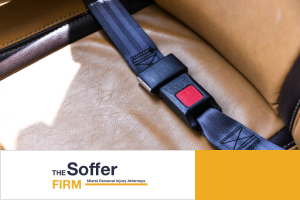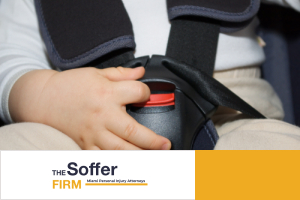
Here, we will overview the required car seats for different age groups. Moreover, we will also discuss how each regulation applies to child passengers in Florida. Knowing and following these rules can help keep your child safe while on the road.
At The Soffer Firm, our experienced car accident lawyer can help you understand the importance of implementing these laws. Call our car accident attorney now if you are experiencing legal disputes with Florida’s car seat laws!
Florida Car Seat Law Exceptions
There are some exceptions to Florida’s car seat law. For example, a child with a persistent medical condition may ride in the backseat without a booster seat. However, the child must wear a seat belt to ensure safety.
In addition, a driver is not responsible for ensuring that car seats are installed correctly. That responsibility falls to the child’s parents or guardians. A child’s parents should provide a booster seat if they request another person to drive their kid.
Florida car seat laws also do not apply to buses that meet a specific definition. In addition, it does not apply to farm equipment, motorcycles, and bicycles.
Height and Weight Requirements
Florida car seat laws state that children at least four feet & nine inches tall can use a booster seat. Otherwise, they must use a front-facing seat until they outgrow the requirements. The child’s weight is also a significant factor when determining which car seat to use.
For example, the Florida Booster Seats for Children website recommends that kids weigh 40 pounds and under 80 inches tall. Moreover, they must be cognitively developed enough not to unbuckle their belts.
Once a child meets the height and weight requirements, they must ride in a regular vehicle seat with a lap or shoulder belt. Plus, all passengers aged 17 years old and younger must use the appropriate restraints at all times while riding in vehicles.
The person who drives a child younger than six years old must use the appropriate car seat or booster seat. But there is an exception to this law. If a child has a medical condition and cannot sit in a car seat or booster seat, they may ride in the backseat without one. However, children with such conditions must wear their safety belts at all times.
Child Restraint Laws in Florida
According to Florida Statute 316.613, all children younger than four years old must be restrained in a child safety seat. This requirement also applies to kids younger than eight years old and who weigh less than 80 pounds.
There are three available types of child safety seats: rear-facing, forward-facing, and booster seats. Rear-facing seats are designed for infants and toddlers. These seats keep the child in a more reclined position and distribute the force of a crash across the entire back.
Forward-facing seats are for older children who have outgrown their rear-facing seats. These seats typically have harnesses that restrain the child in an upright position.
Booster seats elevate a child so that the car’s seat belt fits correctly. This lets the seat belt spread out the force of an impact across a larger surface area.
Let’s discuss more of these child safety seats below.
Using a Rear-Facing Car Seat
A child must always ride in a rear-facing car seat until at least one year old. This car seat keeps the baby’s head, neck, and spine aligned with their back. In addition, this type of seat also protects the child’s organs from harm.
After your child turns one year old and meets all height and weight requirements, they can transition to a forward-facing car seat.
Using a Forward-Facing Car Seat
A forward-facing car seat protects children who have outgrown their rear-facing seats. These seats are designed with harnesses. This will keep the child’s body upright during accidents.
Moreover, these restraints distribute the force of impact across larger surface areas. Because of this, this seat can help prevent injuries.
In case your kid weighs at least 40 pounds and has met all height and weight requirements. Then they can use a booster seat or standard vehicle seat with a belt. But, you must inform your local law enforcement department if your child is younger than six years old and does not meet those requirements.
Using a Booster Seat
A booster seat is essential for keeping a child safe while riding in a car. The seat elevates the child so that the car’s seat belt fits correctly. In addition, this type of seat helps distribute the force of an impact.
Furthermore, it keeps the child in an upright position. This is vital because the seat belt fits better across the child’s chest and hips when sitting up straight.
Florida car seat laws require that kids weigh 40 pounds or less and be under 80 inches tall to use a booster seat.
When a child meets those requirements, they must ride in a regular vehicle seat with a lap or shoulder belt. All passengers aged 17 years old and younger must use appropriate restraints at all times while riding in a vehicle.
Using a Seat Belt
The state of Florida requires drivers of motor vehicles, front-seat passengers, and children under 18 to use a seat belt while riding in a vehicle.
Seat belts play an integral role in protecting passengers during accidents. These straps keep people in their seats and away from potential injuries.
To be fully protected when wearing a seat belt, it is crucial to wear it correctly. The belt should fit comfortably across your chest and hips. It should never be worn loosely or allow any part of your body to hang out of the car.
Moreover, it would be best never to put the belt behind your back or underneath your arm. Doing so can significantly increase your risk of injury in the event of an accident.
Guidelines for Car Seat Safety in Florida
Observing proper car seat guidelines can give optimal protection to your child. Child car seats need to meet the state’s requirements. Here are some of the most crucial car seat safety guidelines in Florida:
- Always use a car seat or booster seat that meets federal safety standards. Follow all directions on the label and at the manufacturer’s website.
- Florida law requires that kids weigh 40 pounds or less and be under 80 inches tall to use a booster seat.
- When a child meets those requirements, you can use a regular vehicle seat with a lap or shoulder belt. All passengers 17 years old and younger must wear an appropriate safety belt at all times while riding in a vehicle.
- Seat belts play a critical role in protecting passengers during accidents. To be fully protected when wearing one, it is crucial to wear it correctly. A passenger should not wear it loosely, or it will defeat its purpose.
Your child’s safety is always your number one priority when riding in a vehicle. Therefore, you must take all car seat guidelines seriously while driving in Florida. Doing so can help you keep your kids safe during every trip, no matter how short!
Penalties for Not Observing Florida Car Seat Laws
The state of Florida punishes law violators. You could be fined up to $60 for each violation. In addition, you may be required to attend a car seat safety course.
It is important to always abide by car seat safety guidelines while driving in Florida. Failing to follow the local regulation could lead you to lose three points on your license. But most importantly, it puts your child’s life at risk in the event of an accident. It’s best to make sure you buckle up every time you get behind the wheel!
When Can a Child Sit in the Front Seat?
Florida law does not prohibit children from sitting in the front seat of a vehicle. However, it is always safer for them to sit in the back.
The safest place to position your kid is in the backseat of the car. This area is designed to protect them during a collision. When they are seated in the front, they are at an increased risk of being injured.
It’s best to keep your kids as safe as possible while driving in Florida by following all car seat safety guidelines. Doing so can help reduce the risk of injury or even death in the event of an accident.
Reach Out to Our Experienced Car Accident Lawyer to Learn More About Florida Car Seat Laws
Parents should abide by the car seat laws in Florida to protect their children. If you are facing legal disputes with car seat laws, then you must call an experienced lawyer to help you.
Call us now at 786-788-7344 to get a free consultation. You can also fill out our online form if you prefer to do it that way.



